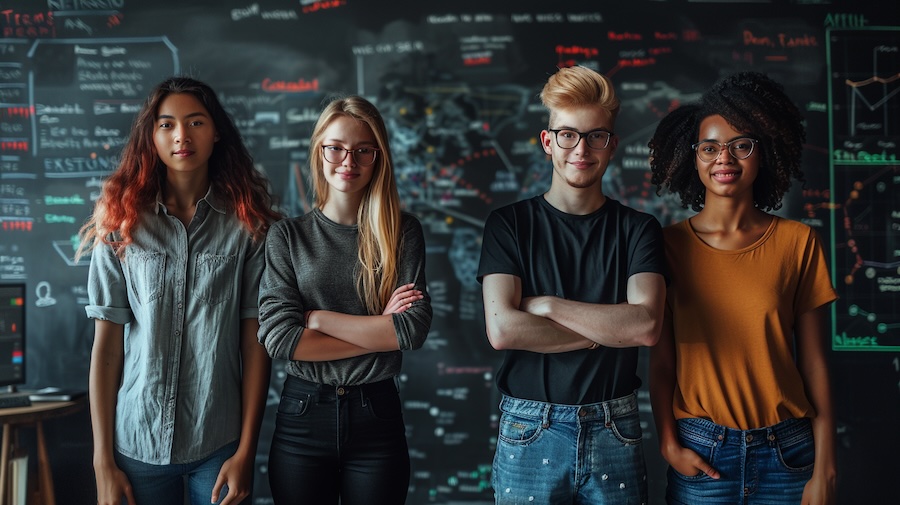“Next Generation Project Managers” (Next-Gen PMs) is a local project started by the Mevhibe Ateş Technology Foundation. Meanwhile, considering all countries’ demands, the foundation aims to make it an international project. Specifically, it intends to train high school students for future market needs for Project Managers, as there is a high demand even today. While it focuses on Erasmus+ Projects, we are still open to other non-European organisations because there is much more from AI to SEO-friendliness. Additionally, L4Y is the German partner for this project and organises and trains German youth under this initiative. Moreover, it is open to the local partner schools in Germany. You can reach our other posts here
Next Generation Project Managers: Introduction
Partners will provide the project budgets from their organisations. Additionally, we will not ask for donations from others. Moreover, the peer trainers are local, and therefore, there will not be much cost for them. Furthermore, associated partners will provide the training environment.
Project Objectives
Enhance Digital Literacy and Content Creation Skills:
Firstly, Equip youth with advanced SEO skills to optimise online content effectively.
Secondly, Foster the ability to write and manage blog posts, contributing to a youth-led website.
Thirdly, Encourage creative expression and digital communication among participants.
Develop Project Preparation and Management Competencies:
Firstly, provide comprehensive training on KA2 project preparations and implementation stages.
Secondly, Equip participants with practical skills for successful KA2 project implementation, focusing on project management, execution, and evaluation.
Finally, cultivate a thorough understanding of project life cycles and management strategies.
Introduce and Utilise Advanced AI Technologies:
Familiarise youth with the concept and practical applications of customised GPTs (myGPT).
Provide hands-on experience creating, customising, and using GPTs for various projects.
Enhance participants’ technical skills and understanding of AI-driven solutions.
Foster Collaboration and Peer Learning:
Facilitate collaborative learning and peer-to-peer training among youth participants.
Encourage the sharing of knowledge and experiences to enhance collective learning.
Build a supportive community that fosters continuous development and mutual growth.
Prepare Youth for Future Career Opportunities:
Encourage participants to explore and pursue careers in technology, AI, project management, and digital content creation.
Provide guidance and mentorship to help youth identify and achieve their career goals.
Equip participants with the skills and confidence needed to succeed in their chosen fields.
Strengthen Partnerships and Community Engagement:
Collaborate with partners and other stakeholders to maximise the impact of the project.
Engage local communities in partner cities to support and benefit from the project’s outcomes.
Foster a culture of community involvement and social responsibility among participants.
Associated Partners from Turkey
Bahçeşehir Koleji – Belen İskenderun, SDGAL, AÇGSL
Next Generation Project Managers: Participant Selections
Peer Trainers Selections
Next-Gen PMs (Next-Generation Project Managers)
For our project with partners, we need a limited number of gender-balanced young people.
Of course, this is within the scope of a project, and you will have responsibility (you will train your peers), so you must comply with the following conditions so that we can carry out disciplined work.
You will be certified as a Peer Educator (the field will differ). But it will not be that easy 🙂
- It is compulsory to attend all training. For example, if you have a job, you can’t attend, or you have an excuse, it’s the same as leaving.
- You also need to show that you are excited about it.
- In fact, training will take precedence over everything else.
- You have to accept the German discipline
- After attending all the training, you must also pass written and oral exams and a final project. This will be even more difficult. You have friends who know how much I sweat, but learning is guaranteed
As a result, we consider peer trainers the project managers will be high-school students.
We need below number of young people from the partner side in these areas
Firstly, SEO-compatible posts (4 peer trainers)
Secondly, the KA2 Project Preparation Phase (2 peer trainers)
Thirdly, artificial Intelligence (4 peer trainers)
Finally, dissemination (graphics, social media management and video editing skills required) (2 skilled young people)
Participant (trainees) Selection
We will decide with each country’s partner
Next Generation Project Managers: Work Packages:
WP1: Coordination and Management
Objective: Ensure smooth project coordination, management, and stakeholder communication.
Activities:
A1.1 – Regular meetings with partners.
A1.2 – Project timeline and task management.
A1.3 – Budget tracking and financial reporting.
A1.4 – Risk management and mitigation strategies.
A1.5 – Progress monitoring and evaluation.
WP2: Digital Literacy, Social Media, and Content Creation Training using GPTs (MAT)
Objective: Enhance digital literacy and content creation skills among youth.
Activities:
A2.1 – Develop training materials on SEO, keyword research, and blog writing.
A2.2 – Train 8 young trainers (gender equal) in Adana and Hatay (during summer 24)
A2.3 – 4 young trainers (each partner) conduct interactive workshops on creating and managing blog content and social media for 160 peers (gender equal). (during Sept – December 24)
A2.4 – Writing Contest (winners will become writers on the website)
A2.5 – Create and maintain a youth-led blog platform on tech, anything related to youth, and youth issues. (Partner’s trainers will lead, and winners will be writers) (MAT will create the website, and TOG will host it) (during Sept 2024)
A2.6 – Content Creation With AI for Social Media Management (L4Y)
A2.7 – Monitor and evaluate the effectiveness of the training.
WP3: Project Preparation and Implementation Skills (MAT)
Objective: Develop project writing and management competencies in youth.
Activities:
A3.1 – Design and deliver training sessions on the KA2 project preparation stage. And train 4 young trainers. (gender equal) (during summer 24)
A3.2 – 4 peer trainers conducted workshops with 160 peers (gender equal) on the KA2 project preparation stage, focusing on creating ideas and checking if they cover the EU objectives. Create a Budget Table and Project Structure. (during Sept-Dec 24)
A3.3 – KA2 Project Preparation Stage Contest (Jan 25) (Project Ideas, Structure, And budget table) (Winners Project ideas will be proposed on March 25)
A3.4 – Design and deliver training sessions on the KA2 project implementation stage. And train 4 young trainers. (gender equal) (during March – Apr 25)
A3.5 – 4 trainers conducted workshops with 160 peers (gender equal) on KA2 project implementation, focusing on project management, execution, and evaluation. (during May – June 25)
A3.6 – Assign 4 mentors to guide participants through project implementation.
Evaluate the progress and outcomes of the training sessions.
WP4: AI and Technological Empowerment Training (MAT)
Objective: Introduce and utilise advanced AI technologies.
Activities:
A4.1 – Develop and deliver training on customised GPTs (myGPT) and their applications. Train 8 youth as trainers (during summer 2024)
A4.2 – Conduct hands-on workshops on utilising GPTs for 400 young people. (during Sep-Dec 2024)
A4.3 – Introduce topics on AI Careers, AI agents and automation, and their future implications. (Two Webinars between Oct-Dec 24)
A4.4 – Seminars with 3 Experts (during Sep-Dec 2024)
A4.5 – Monitor and assess the impact of the training on participants.
WP5: Dissemination (ArtWN)
Objective: Disseminate project results and promote the project to a wider audience.
Activities:
A5.1 – Develop a dissemination plan to share project outcomes and best practices.
A5.2 – Create promotional materials, including brochures, newsletters, and social media content. (training lyrics and songs, videos, and social media posts on LinkedIn, Instagram, Twitter)
A5.3 – Engage with media and stakeholders to raise awareness about the project.
A5.4 – Monitor and evaluate the effectiveness of dissemination activities.
Project Results:
WP1
Efficient Project Management:
Smooth and timely execution of the project according to the plan. As a result, there is effective risk management with minimised disruptions. Furthermore, transparent financial reporting and budget adherence are ensured.
Strong Communication:
Regular and productive meetings with clear minutes and action points. Consequently, open and effective communication channels are maintained among all stakeholders. Additionally, comprehensive progress reports are shared with all partners.
WP2
Enhanced SEO Skills:
Participants acquire in-depth knowledge of SEO techniques and tools. Consequently, they develop an improved ability to optimise online content for search engines. As a result, their content ranks higher and attracts more traffic.
Youth-Led Blog Platform:
A fully functional blog platform managed by youth participants is established. As a result, there is regular publication of high-quality, SEO-optimised blog posts. Consequently, this leads to an increased digital presence and engagement from the youth community. Moreover, the platform encourages creative expression and collaboration.
Practical Content Creation Experience:
Participants gain hands-on experience in writing and managing blog content. This experience, in turn, significantly improves their writing skills and boosts their confidence in content creation. Furthermore, it prepares them for future opportunities in digital content creation.
WP3
Proficient Project Writers:
Participants develop strong skills in writing KA2 project preparations. Consequently, this leads to an increased success rate in securing project funding.
Effective Project Implementers:
Participants gain practical skills in managing and implementing KA2 projects. As a result, they achieve successful execution of participant-led projects with measurable impact.
Mentorship Outcomes:
Positive feedback from mentors and mentees on the mentoring process indicates effective guidance and support.
WP4
AI Proficiency:
Participants understand the fundamentals of AI and customised GPTs. Besides this, they also gain hands-on experience in creating and using customised GPTs.
Informed Youth:
Participants are well-informed about AI agents and automation. Consequently, this results in increased awareness of the future implications of AI and technology.
WP5
Wide Dissemination:
The project outcomes were successfully disseminated to a broader audience, resulting in increased awareness and engagement through promotional materials and events.
Stakeholder Engagement:
Strong relationships were built with the media, stakeholders, and the wider community. Additionally, there was positive feedback and support from stakeholders for project activities.
Sustainable Impact:
The project achieved long-term sustainability and scalability through continuous dissemination efforts. As a result, there was ongoing interest and participation in future iterations of the project.
These updates highlight the streamlined focus of the project, ensuring impactful results and a clear path to achieving the objectives.
Next Generation Project Managers: Conclusion
In conclusion, we are hopeful that this international project will help a promising job for the next generation, of project managers, empowered with cutting-edge technology.
Also, if you are a school in Europe (non-Europeans will have different training) or other countries please do not hesitate to contact bilgi@matvakfi.org.tr. Additionally, please write Next Generation Project Managers to the Subject field of your email.















